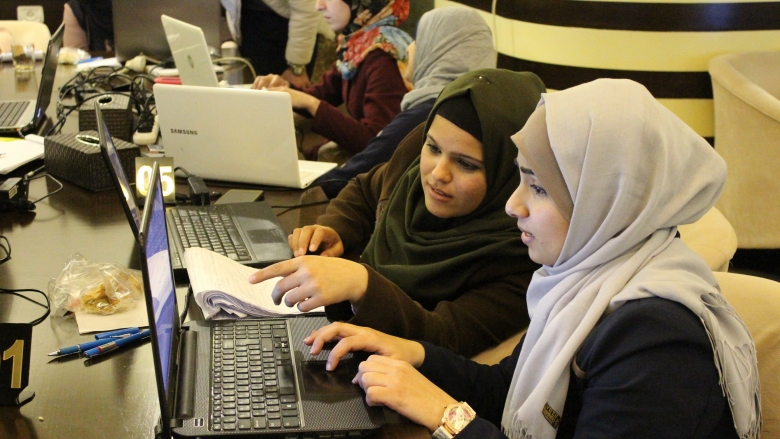Bassma Ali’s company, G-Gateway – Gaza’s only female-headed information, communication, and technology (ICT) firm – provides women with flexible employment to support their families, contributing to SDG Goal 1 No Poverty. Since COVID-19 hit, it has been creating digital learning opportunities through new virtual training and online learning resources. This has enabled around 262 unemployed youth to learn or work remotely in 2020, Bassma reports.
Remote working arrangements have helped clients and employees pivot to tap and create digital resources. To date, G-Gateway has trained more than 1,000 graduates, creating 150 long-term jobs through its ICT outsourcing business services, as well as enabled more than 1,000 short-term employment opportunities through remote working. The majority of these workers are women, who are using these opportunities to sustain their income, according to Bassma.
Bassma’s company is one of seven winners from among 2,400 applicants to the World Bank Group’s annual SDGs&Her competition. In partnership with UNDP, UN Women, and the Wharton School Zicklin Center, the competition supports women entrepreneurs around the world, so that they can thrive in their businesses while helping achieve the Sustainable Development Goals (SDGs).
Since COVID-19 hit, the World Bank Group has taken fast action to help strengthen the global pandemic response. Projects are deploying $160 billion in financing, with support tailored to the health, economic, and social shocks countries are facing.
By women, for women
Even before the pandemic, the world was not on track to end poverty by 2030. Young workers are twice as likely to live in extreme poverty as adults. When Bassma graduated as a software engineer, she found herself among the 1,400 ICT graduates in Gaza without a job. Youth unemployment is an alarming 61% in Gaza, which has the lowest female labor force participation in the Middle East and North Africa, due to mobility restrictions.
Bassma realized that the male-dominated workplace in Gaza made it difficult for women in IT to get a job. Yet she saw the potential in the sector, and a way to bring unprecedented opportunity to women. “The unemployment problem was chronic,” said Bassma. “I spotted an opportunity, by tapping digital work in the freelancing and outsourcing industries. The ICT sector is less vulnerable during crises because it is always in demand and can work across borders,” she said.
“Men can work at any time,” she explained. “Most of the big companies that can afford electricity operate from 8 am to 4 pm. Smaller companies can’t afford generators, so when there is no electricity during the day, they ask employees to work during the night. Women are not allowed to stay away from home at night, so they can’t compete with men, who can work at all hours.”
Building digital opportunity
Now employees, especially women, can organize their work hours around their home schedule and children, removing the constraints related to movement and access to electricity. During the pandemic, this has helped position women towards SDG 5 to Achieve gender equality, because they have been disproportionately affected by the crisis. G-Gateway provides laptops and helps pay for electricity as needed, so that employees and trainees can work comfortably from home.
With the world facing the worst economic recession since the Great Depression, “Our remote work and freelancing opportunities make it possible for women to become part of the work force and be productive, even during the pandemic,” said Bassma. “We have become visible in the workforce,” she adds, which contributes towards SDG 8, to promote Decent work and economic growth.
“Our vision is to change human lives,” said Bassma. “We want young people to be in control of their destiny, and empowered to change the world for the better. The digital space is one of the few places where you can create change beyond all the impossibility that we face in Gaza every day,” said Bassma. “My own struggle and experience here have inspired me to continue, to deliver productive work from home despite conflict and the pandemic.”
About SDGs&Her:
In 2015, all 193 United Nations member countries signed on to 17 Sustainable Development Goals (SDGs) to "create the future we want in 2030.” SDGs&Her is an online competition for women entrepreneurs to showcase how they are supporting the Sustainable Development Goals (SDGs) through business leadership.

